Navy Religious Program Specialists (RP) primarily assist Navy Chaplains in the performance of the chaplain’s duties. They also support the Chaplains in developing and implementing programs that help to meet the needs of Sailors and Marines.
RPs also serve as Navy Chaplain’s armed bodyguards.
2019 marked a rather special year for US Navy sailors who serve as Religious Program Specialists (RP).
Related Article: Army Chaplain Assistant (MOS 56M): Career Details
Jump To A Section
Requirements and Qualifications
Training And Career Path
What’s Life Like For A Religious Program Specialist?
Sea/Shore Rotation
Pay And Benefits
Reviews
Civilian Career Opportunities
Summary
History of Religious Program Specialists
The rating turned forty that year. The journey of the RP rating (like the journey of most 40-year-olds) was full of twists and turns.
During World War II, the Navy adopted the Specialist “W” (Welfare) rating to assist Navy Chaplains during the war, addressing the unique needs of the chaplaincy.
At that time, these duties included playing piano and organ during worship services, acting as musical directors, and performing clerical duties.
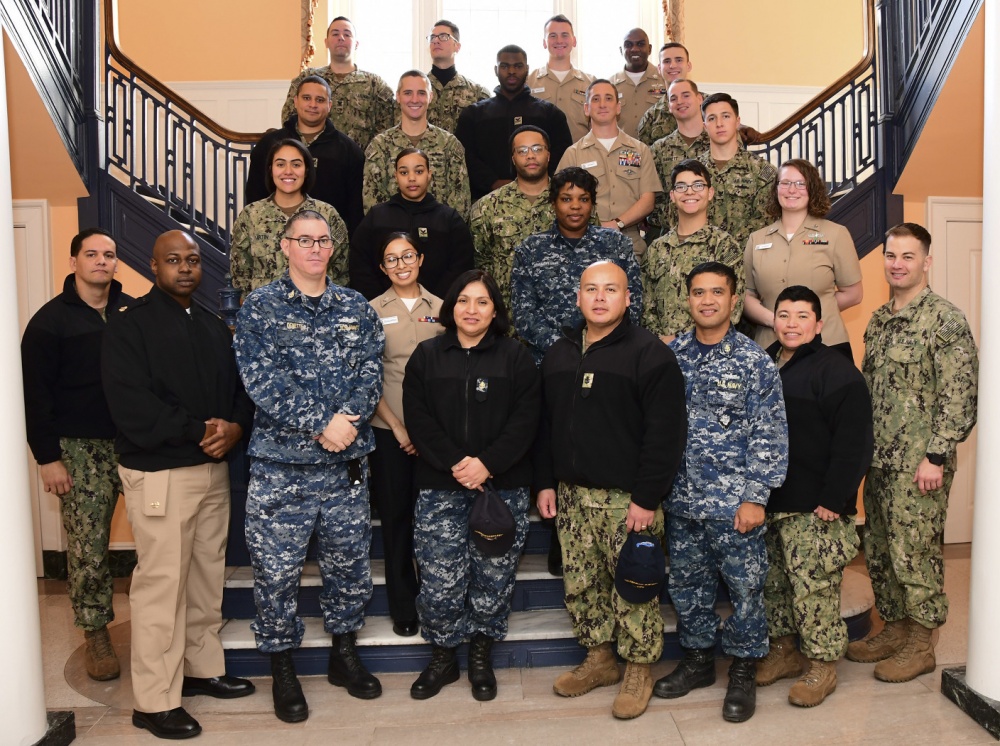
Just like today’s RPs, the WWII Specialists “Ws” did not serve as religious leaders during the war. However, they did serve anywhere under any conditions, including on the battlefield.
In 1942, W. Everett Hendricks was the first sailor to enlist in the Navy as a “W” Specialist. He served at the Naval Training Station (NTC) at Great Lakes, Illinois, and was a talented choir director and musician who contributed significantly to the celebrated Great Lakes Bluejacket Choir.
Related Article – Air Force Public Health (4E0X1): Career Details
Religious Program Specialists Post WWII
The Navy discontinued the Specialist “W” rating after the war in 1945.
However, having realized the contribution that “W” Specialists provided during the conflict, the Navy saw the value in providing Navy Chaplains with assistants.
Initially, the Navy used qualified sailors from the Yeoman (YN) and Personnelman (PN) ratings to provide this support.
Finally, in 1979, the Navy officially established the Religious Program Specialist rating.
There were several conditions that these pioneers had to meet. The most important and taxing of these was the willingness to serve as a combatant with the US Marine Corps.
As Navy Chaplains are non-combatants, however, they require protection during times of conflict. This is why RPs receive combat training from the USMC in Camp Lejeune, North Carolina, to this very day.
Navy RPs in the 21st Century
In the early 2000s, the Navy considered merging RPs back into the YN rate, along with Legalman (LN) and Cryptologic Technician Administration (CTA,) in their reduction-in-force (RIF) efforts.
However, they abandoned the notion rather quickly when they realized the importance of the roles RPs served, particularly with the Marine Corps.
Navy RPs do not require ordination, do not act as religious leaders, nor do they provide pastoral or religious counseling to Marines, Sailors, or their families.
Adherence to religion is not a requirement to be an RP, with some agnostic and atheist members serving as Religious Program Specialists.
Related Article: Air Force Chaplain: Career Details

Requirements and Qualifications
To serve as a Navy Religious Program Specialist (RP) in the United States Navy, you must meet certain requirements:
- Must be a US citizen.
- Must be between the ages of 18 and 41.
- Must have a high school diploma or its equivalent.
- Those with a GED equivalent must have successfully completed the 10th grade of high school
- Must be eligible for a security clearance.
- No NJP or civil convictions in the past two years.
- No moral turpitude charges (ever).
- No speech impediments.
- Ability to write effectively.
- Interview and recommendation of Navy Chaplain/RP Screening committee comprising at least one Chaplain of the rank of LCDR or above and one RP with the rank of E6 or above.
- Must possess a valid driver’s license.
- Must be able to type 30 WPM.
- May not be an ordained religious leader (i.e. rabbis, ministers, imams, etc.)
You must have an Armed Forces Vocational Aptitude Battery (ASVAB) score of VE (Verbal) + MK (Mathematics Knowledge) = 105. Alternatively, an ASVAB score of VE+MK+Coding Speed (CS) >=157 will also qualify you.
The Religious Program (RP) Screening Form is available online from the Navy Personnel Command Religious Program Specialist (RP) Overview page.
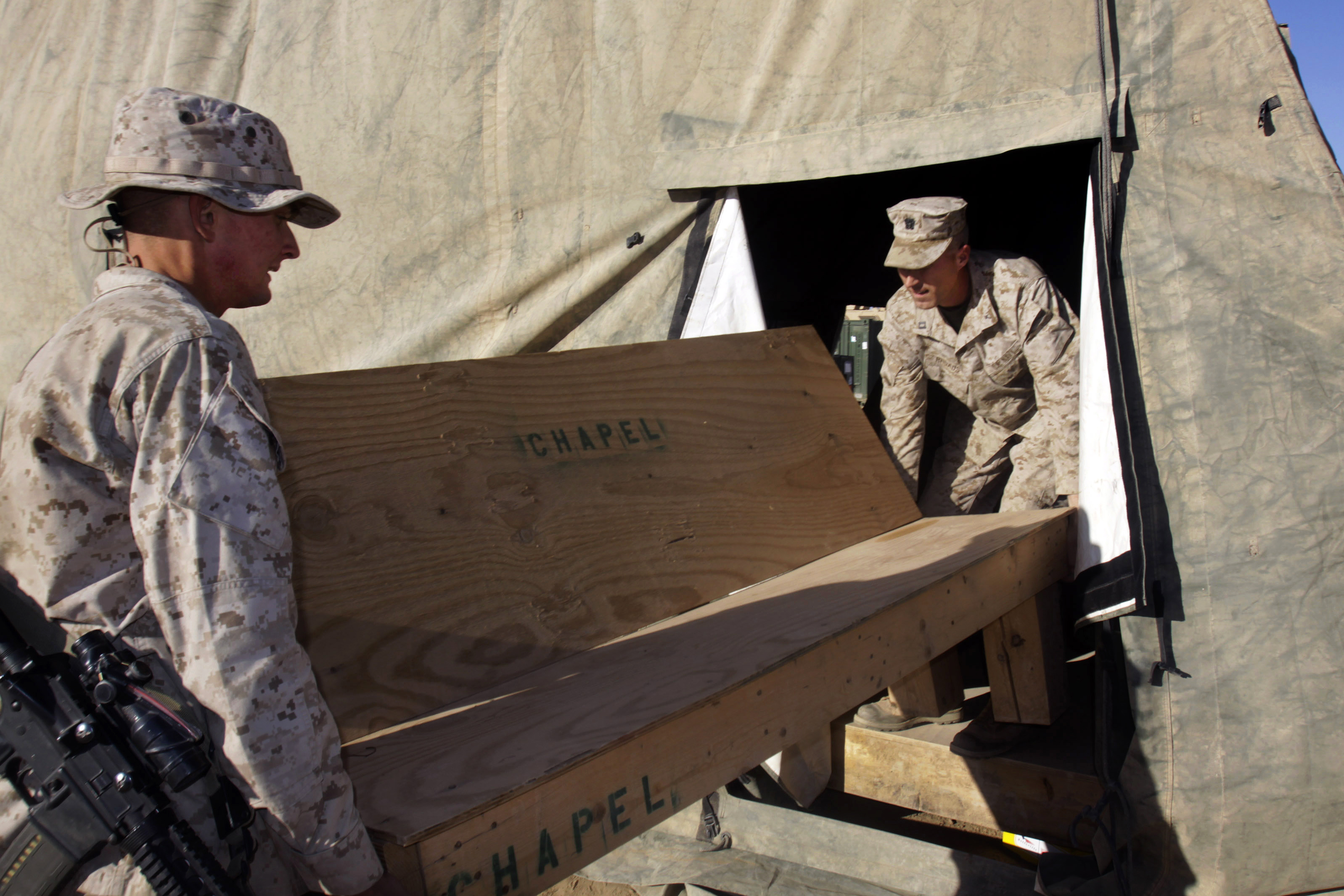
Related Article – Navy Yeoman (YN): Career Details
Training and Career Path
RPs, like all other Navy enlisted personnel, must successfully complete 10 weeks of Navy Recruit Training, at the Recruit Training Command, Great Lakes (RTC Great Lakes).
Afterward, hopeful RPs attend A School at the Naval Chaplaincy School & Center at Fort Jackson, SC for 8 weeks. There, they learn the basic skills they need to perform in their rating.
From there, it’s five more weeks in Camp Lejeune, North Carolina where the Religious Program Specialist learns basic Marine combat skills in Marine Combat Training “C” School.
What’s Life Like for a Religious Program Specialist (RP)?
Navy Chaplains rely on RPs to assist them in developing and administering programs to meet the religious and spiritual needs of Navy, Coast Guard, and Marine personnel and their families.
In the early stages of their careers, they primarily provide clerical support for Chaplains. RPs maintain records and religious documents for a wide range of denominations and faith groups.
Religious Program Specialists assist in preparing materials and presentations for religious programs and ensure that all represented faiths in their duty section have the materials and services they require from the Chaplain’s organization.
RPs maintain libraries and perform bookkeeping for religious offerings. They also maintain, clean, and set up ceremonial spaces for religious activities. They also publicize the Chaplain’s programs and services.
Later in their careers, RPs may find themselves advising leadership on sensitive religious or cultural issues. They are responsible for the ability of their fellow Sailors and Marines to exercise their religion freely.
In expeditionary environments, RPs may need to provide protection for Navy Chaplains and RMTs.
Related Article – Navy Career Counselor (NC): Career Details
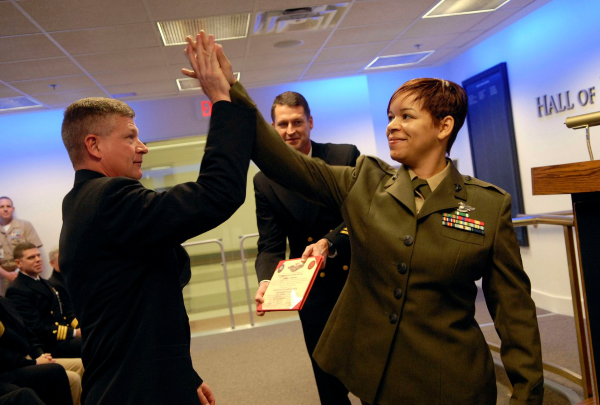
Day-to-Day Duties of a Religious Program Specialist
The day-to-day duties and activities of an RP include:
- Identify, develop, and maintain administrative support for religious programs aboard ships, at shore stations, at hospitals, or Marine Corps units.
- Maintain references and records needed to support the various faith groups and religious denominations.
- Clean and maintain the Chapel, ceremonial spaces, and Chaplain’s offices
- Set up and breakdown facilities for religious activities.
- Promote and disseminate information about available religious programs and services
- Provide administrative support and schedule and train volunteers
- Keep account of religious offerings or charitable drive funds.
- Prepare religious educational materials and audiovisual presentations.
- Work as a liaison between the community and religious agencies.
- Operate and maintain libraries aboard ship and at isolated duty stations.
- Provide physical security for chaplains during field exercises and in combat environments.
Related Article – Navy Personnel Specialist (PS): Career Details
RPs literally work anywhere and everywhere. As they serve all the US Sea Services, they work not only with the Navy but with the Coast Guard and Marines too.
Religious Program Specialists will deploy to the fleet. work at hospitals, on the battlefield, and at on-shore stations.
Be sure that wherever there is a Navy Chaplain, an RP is nearby.
Navy Religious Program Specialist (RP) Sea/Shore Rotation
The Navy defines the RP rating as a “Balanced Rating” CWAY category.
What this means is that the Sea/Shore Rotation for Religious Program Specialists (RP) is about 50 percent ashore and 50 percent assigned to the fleet over the course of a 20-year career.
According to the most recent Sea Shore Flow Tour Length chart, most RPs will spend slightly more time assigned to shore stations.
| Tour | Sea Tour | Shore Tour |
|---|---|---|
| First Tour | 36 Months | 48 Months |
| Second Tour | 36 Months | 48 Months |
| Third Tour | 36 Months | 48 Months |
| Fourth Tour | 36 Months | 36 Months |
| Fifth Tour | 36 Months | 36 Months |
| Sixth Tour | 36 Months | 36 Months |
| Seventh Tour | 36 Months | 36 Months |

Related Article – Navy Musician (MU): Career Details
How Much Are Religious Program Specialists (RP) Paid?
Like all the other branches of the Armed Services, the Navy bases a sailor’s pay on their rank and length of service.
| Insignia | Pay Grade | Rank | Abbreviation | 2023 Minimum Monthly Pay |
|---|---|---|---|---|
| N/A | E-1 +4 months | Seaman Recruit | SR | $1,917.60 |
| E-2 | Seaman Apprentice | SA | $2,149.20 | |
| E-3 | Seaman | SN | $2,259.90 | |
| E-4 | Petty Officer Third Class | PO3 | $2,503.50 | |
| E-5 | Petty Officer Second Class | PO2 | $2,730.30 | |
| E-6 | Petty Officer First Class | PO1 | $2,980.50 | |
| E-7 | Chief Petty Officer | CPO | $3,445.80 | |
| E-8 | Senior Chief Petty Officer | SCPO | $4,957.20 | |
| E-9 | Master Chief Petty Officer | MCPO | $6,055.50 | |
| E-9 | Command Master Chief Petty Officer | CMDCM | $6,055.50 | |
| E-9 | Master Chief Petty Officer Of The Navy | MCPON | $6,055.50 |
RPs may also receive other forms of compensation including Basic Allowance for Housing (BAH), Basic Allowance for Subsistence (BAS), sea pay, etc.. Pay and benefits depend on whether they’re active duty or Navy Reserve.
Job Reviews
Reviews on the career website indeed.com by former and current RPs are many and positive albeit difficult.
One reviewing RP who served four combat deployments with the Marines in Iraq called it, “Rewarding. One of the hardest jobs that I have done.”
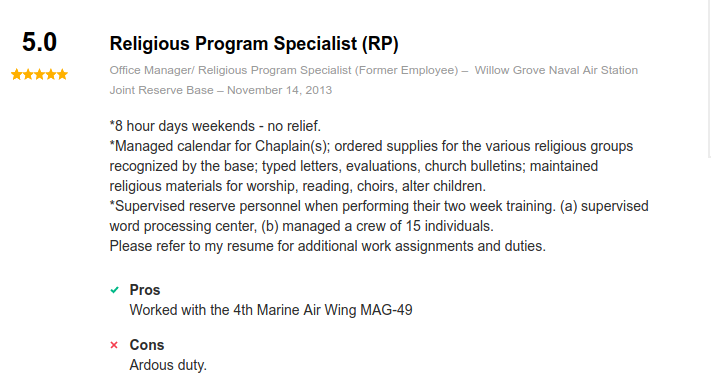


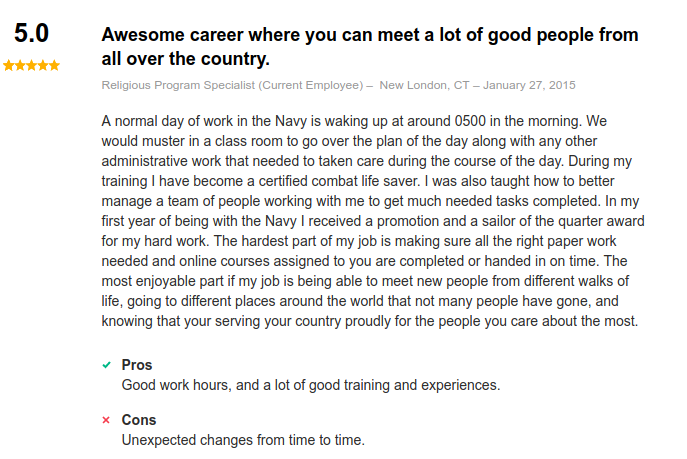

The Department of the Navy’s Credentialing Opportunities Online (COOL) website estimates there are about 700 sailors serving as Religious Program Specialists in today’s Navy.
Related Article – Marine Corps Administrative Specialist (MOS 01111): Career Details
Civilian Career Opportunities
Religious Program Specialists retiring or departing the Navy suffer from no shortage of civilian career opportunities after their service to our county
The Navy COOL Summary For Religious Program Specialists (RP) lists several pages of possible civilian job opportunities post-Navy. A few of these include:
- Administrative Services Managers
- Arbitrators, Mediators, and Conciliators
- Bookkeeping, Accounting, and Auditing Clerks
- Community Health Workers
- Education Administrators, Kindergarten through Secondary
- Directors, Religious Activities and Education
- First-Line Supervisors of Administrative Support Workers
- Meeting, Convention, and Event Planners
- Mental Health and Substance Abuse Social Workers
- Receptionists and Information Clerks
- Social and Community Service Managers
- Social and Human Service Assistants
- Training and Development Specialists
Some of these careers may require a 4-year or advanced degree. So, RPs should take full advantage of the educational opportunities offered during their naval service.
Related Article – Navy Logistics Specialist (LS): Career Details

The United States Military Apprenticeship Program (USMAP) also allows RPs to complete several of their civilian apprenticeship requirements while on active duty.
Navy RPs can obtain several national certifications and state licenses that will make their civilian job search much easier.
Summary
Young people of high moral character, tolerant of others’ religious views,and undaunted by the prospect of duty in combat situations may find being an RP the right career move.
However, they need to understand that RP duties are often performed in the evenings, on the weekends, and on holidays.
A genuine interest in people and a compassionate, empathetic disposition are common traits in Navy RPs.
What could be better than not only serving your country, seeing the world, and helping your fellow sailors, Marines, and their families?
References
Navy COOL Religious Program Specialist (RP) Rating Card
Official Navy Religious Program Specialist (RP) Careers Page
Navy Personnel Command Religious Program Specialist (RP) Overview
U.S. Navy COOL Summary For Religious Program Specialist (RP)
Navy Religious Program Specialist (RP) Reviews – indeed.com
U.S. Navy RP Training Returns to its Original Home
- Gas Turbine Systems Technician (GSM and GSE): Career Details - June 18, 2024
- Interior Communications Electrician (IC): 2023 Career Details - June 18, 2024
- Religious Program Specialist (RP): 2023 Career Details - June 18, 2024
Originally posted on September 8, 2019 @ 1:41 am
Affiliate Disclosure: This post may contain affiliate links. If you click and purchase, I may receive a small commission at no extra cost to you. I only recommend products I have personally vetted. Learn more.